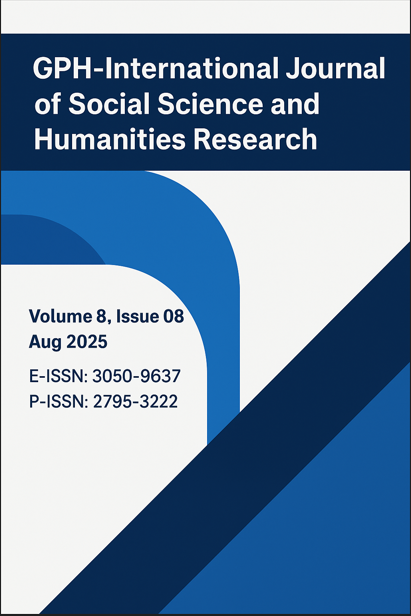STRENGTHENING NATIONAL RESILIENCE THROUGH DEFENSE ENTREPRENEURSHIP IN THE ERA OF GLOBALIZATION
Abstract
This study aims to analyze the role of defense entrepreneurship in strengthening national resilience in the era of globalization. Globalization demands that countries be independent in the defense sector, particularly through innovation, strategic industrial independence, and strengthening the defense entrepreneurship ecosystem. The research method used is a qualitative case study approach. Primary data was obtained through in-depth interviews with academics, defense industry practitioners, and policymakers, while secondary data was collected from policy documents, official reports, and related scientific publications. Data analysis was conducted using NVivo 12 Plus software for coding, categorizing, and thematic analysis. Within the theoretical framework, this study uses the National Resilience Theory, which emphasizes the importance of ideological, political, economic, socio-cultural, and defense and security aspects (Asta Gatra), and is supported by the concept of Entrepreneurial Ecosystem Theory to explain the dynamics of defense innovation development. The results show that defense entrepreneurship plays a strategic role in increasing the independence of the defense industry through collaboration between the government, academics, and business actors. In addition, the emergence of defense technology start-ups can strengthen national competitiveness amidst the pressures of globalization. This study concludes that strengthening national resilience requires the integration of defense innovation policies, entrepreneurial support, and the use of digital technology. Research recommendations are directed at establishing a defense entrepreneurship ecosystem that is inclusive, sustainable, and adaptive to global dynamics.
Downloads
References
Angrosino, M. (2007). Doing ethnographic and observational research. SAGE.
An-Nur. (2023). Ketahanan nasional Indonesia: Pengertian, sejarah, konsepsi, asas, unsur, dan tantangan globalisasi. An-Nur. https://an-nur.ac.id/blog/ketahanan-nasional-indonesia-pengertian-sejarah-konsepsi-asas-unsur-dan-tantangan-globalisasi.html
Bowen, G. A. (2009). Document analysis as a qualitative research method. Qualitative Research Journal, 9(2), 27–40. https://doi.org/10.3316/QRJ0902027
Braun, V., & Clarke, V. (2006). Using thematic analysis in psychology. Qualitative Research in Psychology, 3(2), 77–101. https://doi.org/10.1191/1478088706qp063oa
Creswell, J. W., & Poth, C. N. (2018). Qualitative inquiry and research design: Choosing among five approaches (4th ed.). SAGE Publications.
Defend ID. (2024). Defend ID. Wikipedia. https://en.wikipedia.org/wiki/Defend_ID
Lincoln, Y. S., & Guba, E. G. (1985). Naturalistic inquiry. SAGE Publications.
QuestionAI. (2023). Membangun ketahanan nasional di era disrupsi: Peran.... QuestionAI. https://www.questionai.id/essays-eNAAmqMjhj7/membangun-ketahanan-nasional-di-era-disrupsi-peran
Senberg, D. J. (2011). The entrepreneurship ecosystem strategy as a new paradigm for economic policy: Principles for cultivating entrepreneurship. Babson Entrepreneurship Ecosystem Project, Babson College.
Suryohadiprojo, S. (1997). Ketahanan nasional. Jakarta: Balai Pustaka.
Zamawe, F. C. (2015). The implication of using NVivo software in qualitative data analysis: Evidence-based reflections. Malawi Medical Journal, 27(1), 13–15. https://doi.org/10.4314/mmj.v27i1.4
Ketahanan Nasional melalui Defense Entrepreneurship di Era Globalisasi” dari berbagai aspek seperti kemandirian industri, inovasi pertahanan, kolaborasi lintas sektor, dan ketahanan digital/ideologis:
Sudirman, A., Djuyandi, Y., & Pratama, F. S. G. (2022). Memahami dinamika kerjasama industri pertahanan dalam kerangka Indonesia – Australia Defence Security Dialogue. Jurnal Political Issues, 4(2). https://doi.org/10.33019/jpi.v4i2.82
Yulivan, I., Mahroza, J., Rianto, R., Prakoso, L. Y., & Setiadi, M. I. (2024). Defense entrepreneurship as a solution to RI’s limited defense budget. Indonesian Journal of Interdisciplinary Research in Science and Technology, 2(1), 71–80. https://doi.org/10.55927/marcopolo.v2i1.7710
Surahman, S., Putra, I. N., Khaerudin, K., & Asvial, M. (2025). The independence of the Indonesian defense industry and challenges in defense budget allocation. International Journal Of Humanities Education and Social Sciences, 3(4). https://doi.org/10.55227/ijhess.v3i4.738
Quirinno, R. S., Suwito, S., & Prakoso, L. Y. (2024). Optimizing national security: The importance of private sector involvement in the Indonesia defense industry. International Journal Of Humanities Education and Social Sciences, 4(1). https://doi.org/10.55227/ijhess.v4i1.1068
Tarjana, R., Bahari, S., & Yudho, L. (2025). Domestic defense industry policy in Indonesia to realize independence in TNI AU defense systems. Contemporary Journal of Applied Sciences, 3(7). https://doi.org/10.55927/cjas.v3i7.45
Haryadi, A., Sulistyadi, E., & Asmoro, N. (2025). Driving innovation in the defense sector: Unlocking the power of industry, academia, and government collaboration. Formosa Journal of Multidisciplinary Research, 4(2). https://doi.org/10.55927/fjmr.v4i2.48
Susanto, S. H., Supriyadi, A. A., & Harefa, F. (2025). National defense policy based on readiness against non-military threat. Lebah (ABDimas), 18(4). https://doi.org/10.35335/lebah.v18i4.361
Anu, S., Hadisancoko, R. E., & Suwito, S. (2024). Defense economic strategy in creating the independence of the Indonesian defense industry: Case study of the independence of the Chinese defense industry. AURELIA: Jurnal Penelitian dan Pengabdian Masyarakat Indonesia, 2(1). https://doi.org/10.57235/aurelia.v2i1.246
Fathun, L. M., Maharani, T. P., & Angkotasan, N. A. S. P. (2024). Opportunities and challenges of the state defense paradigm in the era of globalization. Jurnal Pertahanan: Media Informasi tentang Kajian dan Strategi Pertahanan, Identity, Nationalism, and Integrity. https://jurnal.idu.ac.id/index.php/DefenseJournal/article/view/6675
Dolonseda, N. A. (2022). The strategic role of the defense industry in answering the needs of KRI capability C4ISR to achieve maritime security in Indonesian national jurisdictions. Jurnal Ekonomi, Bisnis & Entrepreneurship (e-Journal), 16(2), 99–106. https://doi.org/10.55208/jebe.v16i2.251
The authors and co-authors warrant that the article is their original work, does not infringe any copyright, and has not been published elsewhere. By submitting the article to GPH-International Journal of Social Science and Humanities Research, the authors agree that the journal has the right to retract or remove the article in case of proven ethical misconduct.














 Firozpur Jhirka, Haryana, India
Firozpur Jhirka, Haryana, India

